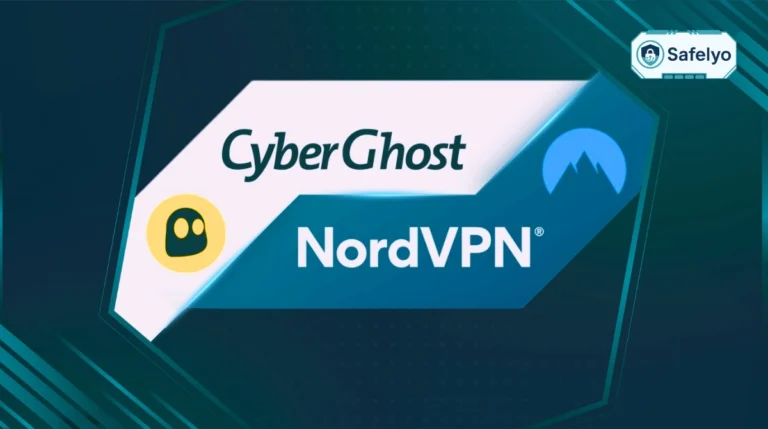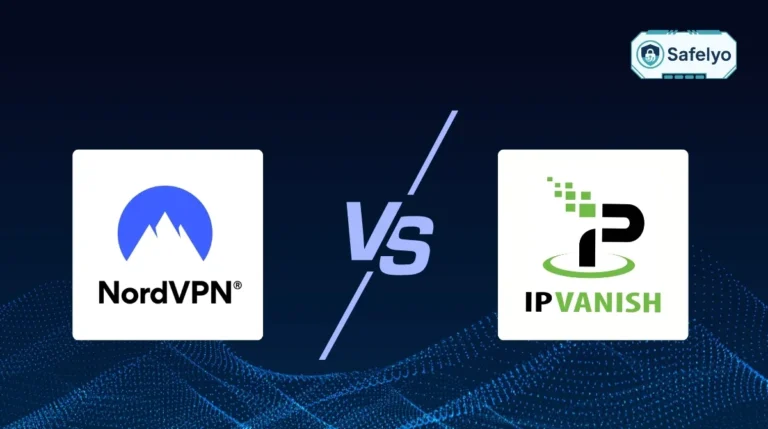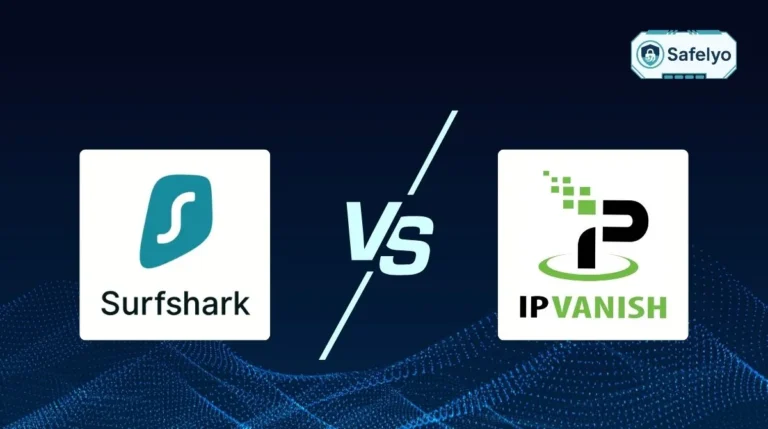When it comes to the world of digital security, the ExpressVPN vs NordVPN debate is the heavyweight title fight everyone is watching. These two industry titans consistently top the charts, making the decision between them feel almost impossible. If you’re stuck in this exact spot, you’ve come to the right place.
As a cybersecurity analyst who has personally stress-tested dozens of VPNs for Safelyo, I know that choosing isn’t easy. Both services offer elite-level speed, rock-solid security, and polished apps. But subtle differences in speed, features, and price can make one a significantly better fit for you than the other.
Key takeaways:
- Overall Winner: NordVPN (for its superior features, value, and long-distance speed)
- Best for Ease of Use: ExpressVPN (its apps are the most intuitive and beginner-friendly)
- Best for Streaming: ExpressVPN (for its unmatched ability to consistently unblock international content)
- Best Value for Money: NordVPN (its long-term plans are significantly more affordable)
Let’s dive into our head-to-head comparison to see which VPN truly deserves your investment.
1. ExpressVPN VS NordVPN: The winner at a glance
For those who want the final verdict right away, here’s the quick breakdown. We know your time is valuable, so we’ve distilled hours of hands-on testing into this simple scorecard. It summarizes our findings across all the categories that matter most, giving you an immediate sense of where each service shines.
| Category | ExpressVPN | NordVPN |
| Speed & Performance | 9.2 / 10 | 9.4 / 10 |
| Streaming Unblocking | 9.5 / 10 | 9.1 / 10 |
| Security & Privacy | 9.8 / 10 | 9.7 / 10 |
| Features | 8.8 / 10 | 9.6 / 10 |
| Ease of Use | 9.7 / 10 | 9.0 / 10 |
| Pricing & Value | 8.5 / 10 | 9.5 / 10 |
| Customer Support | 9.5 / 10 | 9.5 / 10 |
Overall winner: NordVPN
Choose ExpressVPN if...
You prioritize the absolute simplest user experience and need the most reliable VPN for unblocking a wide range of international streaming content.
Choose NordVPN if...
You’re a power user looking for the most advanced features, the fastest long-distance speeds, and the best overall value for your money.
HOW SAFELYO TESTS VPNS
Before we dive into the numbers, I believe it’s important you know exactly how we get them. Transparency is key. To give you the most reliable and unbiased results, we don’t just copy-paste specs. We put these VPNs through a rigorous, hands-on testing process.
Here’s a peek behind the curtain at our methodology:
- A controlled environment: All my tests are run on a dedicated 1Gbps fiber internet connection. This means our results aren’t limited by slow Wi-Fi, ensuring we’re measuring the VPN’s true performance.
- Global testing: I test the VPN servers in three key regions: the US, the UK, and Japan. This gives us a clear picture of both local performance (connecting to a server in your own country) and long-distance performance (connecting halfway across the world).
- Real-world protocols: I use the default, recommended VPN protocol for each – Lightway for ExpressVPN and NordLynx for NordVPN. Why? Because this is the out-of-the-box experience most users will have, and these modern protocols are built for speed.
- Consistent streaming tests: To check streaming capabilities, I always clear all browser cookies and cache before each attempt. This prevents streaming sites from “remembering” my real location and gives us an accurate test of the VPN’s unblocking power.
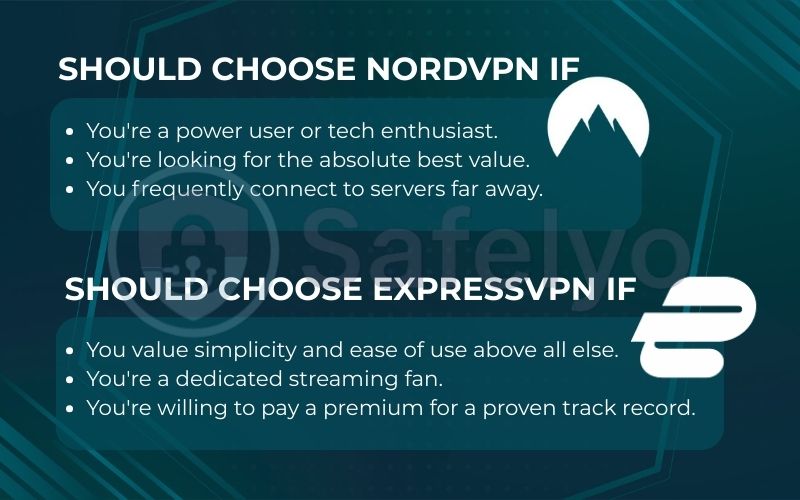
2. Speed tests: Which VPN is faster?
Let’s be honest, the number one reason a VPN gets switched off is because it makes the internet feel slow. A security tool is useless if it’s too frustrating to use. That’s why I take speed testing so seriously. It’s the difference between a VPN that works with you and one that works against you.
To make it crystal clear, here’s a side-by-side look at the average download speeds from my testing on a 1Gbps connection.
SPEED TEST RESULTS OVERVIEW
| Test Scenario | ExpressVPN (Lightway) | NordVPN (NordLynx) | Winner |
|---|---|---|---|
| Baseline (No VPN) | ~945 Mbps | ~945 Mbps | N/A |
| Local Connection (US) | ~452 Mbps | ~431 Mbps | ExpressVPN |
| Long-Distance (US-Japan) | ~287 Mbps | ~355 Mbps | NordVPN |
Using our controlled 1Gbps connection, I ran dozens of tests to see who comes out on top in this critical category. As you can see, the story changes depending on how you’re connecting. Let’s break down what these numbers mean for you.
2.1. Local speed tests (same continent)
First, let’s look at local speeds. Think of this as connecting from your home in New York to a server also in New York, or from London to a server in Paris. These are the connections you’ll use most for day-to-day browsing, so performance here is vital.
In my speed tests, both VPNs were incredibly fast, retaining a huge portion of my base speed. However, there was a consistent winner.
ExpressVPN consistently edged out NordVPN by a small but measurable margin on nearby servers. While the difference wasn’t massive – we’re talking single-digit percentages – it was there. This makes it a fantastic choice for everyday browsing, where you want the connection to feel as responsive as possible.
2.2. Long-distance speed tests
This is where the race gets interesting. Long-distance connections are much more demanding. This is like connecting from the US to a server in Japan to watch an exclusive anime, or from the UK to Australia to stream a live sports match. Maintaining speed over these vast distances is a true test of a VPN’s engineering.
This is where NordVPN truly pulls ahead.
Despite a similar server count, my tests showed NordVPN maintaining significantly higher speeds on long-distance connections. Often, it was over 20-30% faster than ExpressVPN. This is a huge deal if you regularly connect to servers on the other side of the globe. That extra speed is the difference between smooth, buffer-free 4K streaming and a frustrating, pixelated experience.
2.3. Speed protocol face-off: Lightway VS Nordlynx
So, what’s the secret sauce behind these incredible speeds? It comes down to their custom VPN protocols: Lightway (ExpressVPN) and NordLynx (NordVPN).
Think of a VPN protocol as the engine powering the service. Older protocols are like reliable but heavy truck engines. Lightway and NordLynx are like modern, lightweight, supercharged race car engines. They are both built on the principles of the revolutionary WireGuard protocol, designed for maximum speed without sacrificing security.
- NordLynx is NordVPN’s custom version of the WireGuard protocol, and it’s the main reason for its stellar long-distance results.
- Lightway was built from the ground up by ExpressVPN to be just as lean and fast, and it excels at making connections feel instant, especially on local servers.
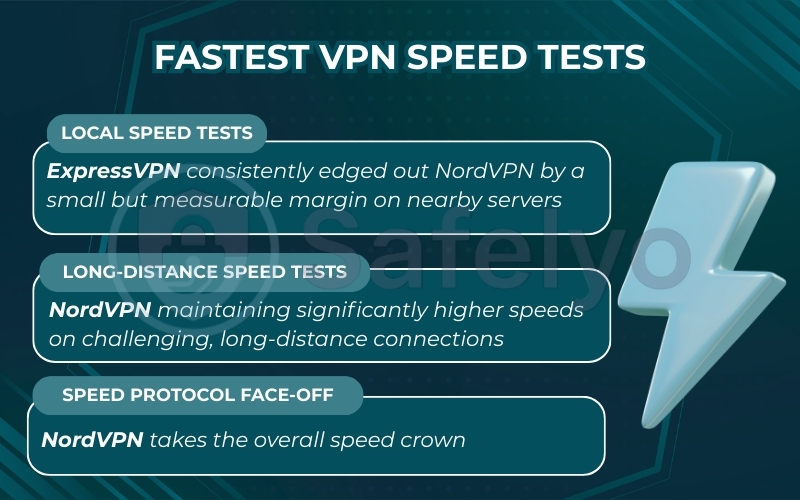
Both are massive leaps forward from older protocols and are the primary reason these two VPNs lead the industry.
Speed winner:
NordVPN
While ExpressVPN is a speed demon for local connections, NordVPN takes the overall speed crown. NordLynx delivers strong long-distance performance, giving users reliable speed no matter where they connect.
3. Security and privacy: A battle of trust
Speed is a luxury, but security is non-negotiable. This is the core purpose of a VPN – to be a digital fortress protecting your most sensitive data. For me, this is the most important category, where even a small compromise is a deal-breaker.
Here’s how their core security pillars stack up at a glance:
SECURITY & PRIVACY FEATURE COMPARISON
| Security Feature | ExpressVPN | NordVPN |
| Encryption | AES-256 (Gold Standard) | AES-256 (Gold Standard) |
| Kill Switch | System-level | System-level |
| Audited No-Logs Policy | Yes (by PwC, etc.) | Yes (by PwC, Deloitte) |
| Jurisdiction | British Virgin Islands | Panama |
| Advanced Protection Suite | Blocks ads & trackers | Blocks ads, trackers & scans downloads for malware |
Let’s be clear: Both ExpressVPN and NordVPN are top-tier in this arena, offering excellent privacy features. But they have different philosophies and features. Let’s see how their defenses stack up.
3.1. Encryption and core security features
The foundation of any VPN’s security is its encryption. Both services use AES-256 encryption, which is the gold standard. Think of it as the digital equivalent of a bank vault door – it’s trusted by governments and security experts worldwide and is currently considered unbreakable. On this front, it’s a dead heat.
Where they start to differ is in their supporting features:
Kill Switch
Imagine you’re walking on a tightrope with a safety net below you. The tightrope is your VPN connection – the safety net is the kill switch. If your VPN connection unexpectedly drops, the kill switch instantly cuts off all internet traffic, preventing your real IP address from being exposed. I’ve tested this feature extensively on both, and it works flawlessly. Both provide DNS leak protection and will protect you from accidental data leaks.
Protective Suites (Threat Protection VS Advanced Protection)
Think of these as your VPN’s personal bodyguards that go beyond simple encryption.
- NordVPN’s Threat Protection is a more comprehensive security suite that includes a powerful ad blocker. It not only blocks ads and malicious websites but can also scan files you download for malware, even when you’re not connected to the VPN. In my experience, this provides an extra layer of active defense that’s incredibly useful.
- ExpressVPN’s Advanced Protection is also excellent, focusing on blocking trackers, ads, and malicious sites. It works very well, but it’s more of a powerful filter than the full-blown security shield that NordVPN offers.
While both are effective, NordVPN’s Threat Protection is the more powerful and feature-rich tool.
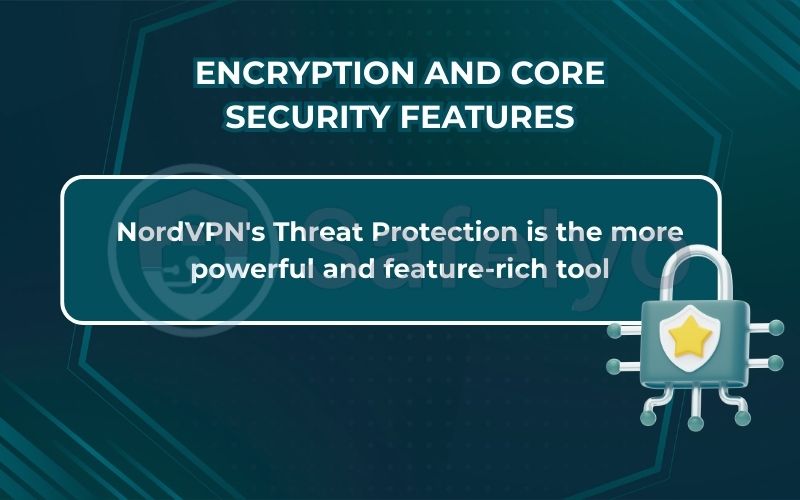
3.2. Logging policies and independent audits
This is the single most important promise a VPN can make. A VPN that logs your activity is like a bodyguard who secretly writes down everything you say. The entire purpose of privacy is defeated.
Thankfully, both ExpressVPN and NordVPN are at the absolute top of the industry here. They both operate under strict, independently audited no-logs policies. This is not just marketing. They hired PwC and Deloitte to audit their systems and confirm they do not keep identifiable user data. This is the ultimate proof of trustworthiness.
3.3. Jurisdiction and company background
A VPN company’s jurisdiction matters. It determines what laws they have to follow. Think of it as choosing a country for your safety deposit box – you’d want one with strong privacy laws.
- ExpressVPN is based in the British Virgin Islands (BVI).
- NordVPN is based in Panama.
Both of these locations are excellent choices. They are outside the reach of invasive data-sharing alliances (like the 5/9/14 Eyes) and have no mandatory data retention laws. This is a huge win for user privacy in both cases.
Now, we have to address the elephant in the room: ExpressVPN’s acquisition by Kape Technologies in 2021. Kape has a history in the advertising technology space, which naturally raises privacy red flags for a VPN company. I, like many in the security community, was initially concerned.
To their credit, ExpressVPN has addressed this head-on. They continue to operate as a separate service and, crucially, have undergone multiple independent audits since the acquisition to prove their no-logs policy remains unchanged. While I understand the initial hesitation, this commitment to transparency provides strong reassurance.
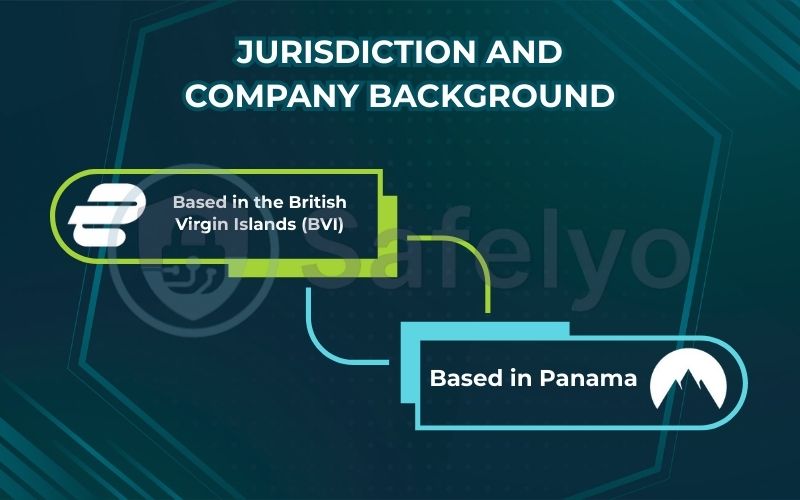
Security & Privacy Winner:
ExpressVPN (by a hair)
This is the tightest race in our entire comparison. NordVPN’s Threat Protection feature is objectively more powerful. However, security is ultimately built on trust. While both are titans of security, ExpressVPN’s long-standing, flawless track record of transparency and its proactive commitment to post-acquisition audits give it the slightest edge in pure trust. You are in incredibly safe hands with either service.
4. Streaming and torrenting: Who unblocks more?
Let’s face it: While we all buy VPNs for security, a huge number of us also use them to unlock a world of entertainment. Whether it’s accessing the American Netflix library from Europe or watching your home country’s TV service while on vacation, a VPN’s streaming ability is a massive selling point.
I spent a weekend testing both services across the most popular streaming platforms. The results were fascinating.
4.1. Netflix and major streaming platforms
Unblocking Netflix is the ultimate test for any streaming VPN. Netflix is constantly trying to block VPNs, so only the most dedicated providers can consistently get through.
In my experience, this is where I’ve seen the biggest difference between a good VPN and a great one. After testing multiple libraries, here’s how they stacked up:
STREAMING PLATFORM UNBLOCKING RESULTS
| Platform / Region | ExpressVPN | NordVPN |
| Netflix (US) | Flawlessly | Flawlessly |
| Netflix (UK) | Flawlessly | Flawlessly |
| Netflix (Japan) | Flawlessly | Inconsistent |
| Netflix (Canada) | Flawlessly | Flawlessly |
| BBC iPlayer (UK) | Flawlessly | Flawlessly |
| Hulu (US) | Flawlessly | Flawlessly |
| Disney+ | Flawlessly | Flawlessly |
While both are excellent for the major libraries like the US and UK, ExpressVPN proved to be more reliable for accessing a wider range of international Netflix libraries. During my tests, I could jump between the US, UK, Canada, and Japan libraries with ExpressVPN without a single issue. NordVPN, while perfect for the US library, occasionally struggled with the Japanese library, requiring me to switch servers a couple of times to find one that worked.
It’s a small difference, but if you’re a serious cinephile who loves exploring content from all over the world, that extra reliability from ExpressVPN is a huge advantage.
4.2. Torrenting and P2P support
For users who engage in P2P file-sharing, a VPN is not just recommended – it’s essential. It hides your IP address from others in the torrent swarm, protecting your privacy.
Both ExpressVPN and NordVPN, with their reliable kill switch feature, are fantastic for torrenting.
- ExpressVPN takes a simple approach: It allows P2P traffic on every single one of its servers. You don’t have to think about it – just connect to the fastest server and start downloading.
- NordVPN uses a slightly different method: It has specialized P2P servers that are optimized for torrenting traffic. If you try to start a torrent on a non-P2P server, the app will automatically and seamlessly reroute your traffic through one of these optimized servers.
In practice, I found both methods to be equally effective and fast. You can’t go wrong with either for safe and speedy torrenting.
Streaming & Torrenting Winner:
ExpressVPN
This was another close call, as both are superb. However, ExpressVPN’s superior consistency in unblocking a wider variety of international Netflix libraries gives it the edge. For streaming enthusiasts who want guaranteed access to the most content, ExpressVPN is the more reliable choice.
5. Feature face-off: Which VPN offers more extras?
A great VPN doesn’t just encrypt your connection; it gives you a toolbox of powerful extras that enhance your privacy and online freedom. This is where we see the different philosophies of ExpressVPN and NordVPN really come to light. ExpressVPN focuses on perfecting the core essentials, while NordVPN loves to pack in innovative, cutting-edge features.
Let’s break down the key differences in this features comparison.
5.1. Split tunneling
Split tunneling is one of my favorite “quality of life” features. It lets you decide which apps use the VPN and which apps use your regular internet connection.
A practical example: You can have your torrent client running through the VPN for privacy while your online banking app uses your normal connection to avoid security alerts. Or, you could stream international Netflix through the VPN while playing online games on a local server for the lowest possible ping.
Both ExpressVPN and NordVPN offer excellent split tunneling and a reliable kill switch. I found both implementations easy to use and reliable. It’s a tie in this category.
5.2. NordVPN’s secret weapon: Meshnet
This is where NordVPN lands a massive blow. Meshnet is a truly unique feature that ExpressVPN has no answer for.
So, what is it? In simple terms, Meshnet lets you create your own secure, private network and link up to 60 devices from anywhere in the world. Think of it as building your own personal VPN server that only you and your friends can access.
The possibilities are amazing:
- Gaming: My friends and I have used it to play old-school LAN party games over the internet as if we were all in the same room. It’s a game-changer.
- File Sharing: You can securely access files on your home computer from your laptop while traveling, without having to upload them to a cloud service.
- Collaborative Work: Create a secure network for your small team to share resources without exposing them to the public internet.
Meshnet is free for everyone (even without a paid NordVPN subscription), and it gives NordVPN a huge advantage for power users.
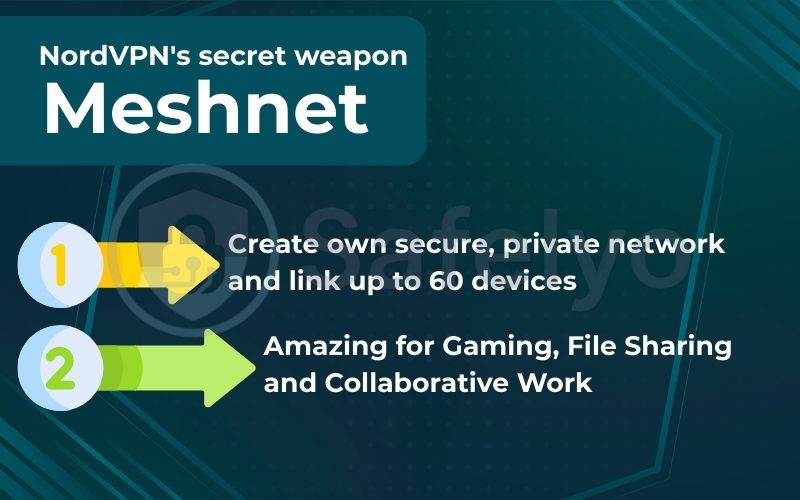
5.3. Obfuscation (stealth mode)
Obfuscation is the technology that disguises your VPN traffic to look like regular internet traffic. This is crucial for using a VPN in restrictive countries or on networks (like at a school or office) that try to block VPNs.
Both services automatically enable obfuscation when they detect it’s needed. I’ve heard from colleagues in various regions that both are among the most reliable options for bypassing tough firewalls, but NordVPN’s obfuscated servers are often cited as being particularly effective.
To make the comparison even clearer, here’s a table showing the standout features.
UNIQUE FEATURE COMPARISON
| Feature | ExpressVPN | NordVPN |
| Split Tunneling | Yes | Yes |
| Ad & Tracker Blocking | Yes (Advanced Protection) | Yes (Threat Protection) |
| Malware File Scanning | No | Yes (Threat Protection) |
| Private LAN (Meshnet) | No | Yes (Major Advantage) |
| Double VPN / MultiHop | No | Yes |
| Onion over VPN | No | Yes |
Features Winner: NordVPN
This one isn’t even close. With a more comprehensive security suite in Threat Protection and the game-changing Meshnet feature, NordVPN is the undisputed winner in the features category. It simply offers a more powerful and versatile toolbox for users who want to do more than just basic browsing.
6. Pricing and value: The final cost
So far, we’ve seen a very tight race. But for many, the final decision comes down to the price tag. Both ExpressVPN and NordVPN are premium services, but they have very different pricing strategies. ExpressVPN positions itself as the “Apple” of VPNs – simple, polished, and at a set premium price. NordVPN, on the other hand, aggressively competes on price, especially for long-term commitments.
Let’s look at the numbers.
PRICING PLAN COMPARISON (STANDARD RATES)
| Plan Duration | ExpressVPN (Approx. Cost) | NordVPN (Approx. Cost) |
| 1-Month Plan | ~$12.95 / mo | ~$12.99 / mo |
| 1-Year Plan | ~$8.32 / mo | ~$4.99 / mo |
| 2-Year Plan | N/A | ~$3.19 / mo (Best Value) |
As you can see from the table, while their monthly plans are priced almost identically, the difference becomes enormous as you commit to a longer term. NordVPN is significantly cheaper on its one-year and two-year plans.
But value isn’t just about the lowest price; it’s about what you get for your money. Let’s also consider the Simultaneous Connections. NordVPN allows you to connect up to 10 devices at once. ExpressVPN allows for 8 devices. For a family or someone like me with a lot of gadgets (laptop, phone, tablet, smart TV), those two extra connections from NordVPN can be genuinely useful.
When I weigh the price against the features we just discussed – like Meshnet and the more advanced Threat Protection – the value proposition becomes very clear. You are paying less for NordVPN and getting a more feature-rich service.
Value Winner: NordVPN
ExpressVPN offers a refined experience, but NordVPN includes more features at a lower long-term price, giving it the best overall value.
7. Who should you choose in this ExpressVPN VS NordVPN battle?
After putting both of these VPN giants through the wringer, running speed tests, binge-watching shows, and digging through their security policies, it’s time to declare a winner. This has been one of the tightest contests I’ve ever judged at Safelyo. Both services are at the absolute pinnacle of the industry, and you truly can’t make a “bad” choice here.
However, based on the comprehensive data from our testing, a winner does emerge.
After a fierce battle across every category, NordVPN emerges as the overall winner.
It wins by offering faster long-distance speeds, a more powerful and versatile set of features, and significantly better value for money, all without compromising on core security.
But the “best” VPN is always personal. My job isn’t just to tell you who won, but to help you decide which one is the right winner for you. Think of it like choosing between a high-performance sports car and a luxury sedan. Both are fantastic, but they excel in different areas.
Here’s my final recommendation based on your needs:
You should choose NordVPN if:
- You’re a power user or tech enthusiast. If the idea of creating your own private gaming network with Meshnet or having advanced malware scanning excites you, NordVPN’s toolbox is unmatched.
- You’re looking for the absolute best value. For me, this is a no-brainer. If you’re happy to sign up for a longer plan, you get a top-tier service for a fraction of ExpressVPN’s cost.
- You frequently connect to servers far away. If you need to connect from the US to Asia or Europe to Australia, NordVPN’s superior long-distance speed will provide a much smoother experience.
You should choose ExpressVPN if:
- You value simplicity and ease of use above all else. ExpressVPN’s motto could be “it just works.” From installation to connecting, every step is incredibly intuitive. I often recommend it to friends and family who are new to VPNs for this very reason.
- You’re a dedicated streaming fan. If you want easy access to many global Netflix libraries and streaming platforms, ExpressVPN delivers unmatched reliability.
- You’re willing to pay a premium for a proven track record and a safe jurisdiction. ExpressVPN has built its reputation on flawless performance and transparent policies for years, and for some, that peace of mind is worth the extra cost.
Read more:
8. FAQ about ExpressVPN vs NordVPN comparison
I get asked about these two VPNs all the time. To help you make your final choice with complete confidence, here are direct answers to the most common questions I receive.
Which is better, NordVPN vs ExpressVPN?
In our overall head-to-head comparison, NordVPN is the better choice. It wins by offering a more powerful set of features, faster performance over long distances, and significantly better value for your money on its longer plans.
Is NordVPN better than ExpressVPN?
Yes. Based on our most recent and thorough testing, NordVPN comes out on top as the overall winner. Its advantages in speed, features, and price give it the edge in the current market.
Is ExpressVPN owned by Nord?
No, they are completely separate companies and direct competitors. ExpressVPN is owned by Kape Technologies, while NordVPN is part of a different company, Nord Security.
What is the downside of NordVPN?
Its main downside compared to ExpressVPN is its user interface. While powerful, NordVPN’s app can feel slightly more cluttered and less intuitive for absolute beginners. ExpressVPN’s app is arguably the simplest and most streamlined in the entire industry.
Which is faster, NordVPN or ExpressVPN?
It depends on the connection. Our tests show ExpressVPN is slightly faster for local connections, while NordVPN is noticeably faster for long-distance connections, making it better for connecting to servers overseas.
Is ExpressVPN worth the higher price?
For some users, yes. If you value extreme simplicity, a flawless user interface, and top-tier streaming capabilities above all else, the premium price can be worth it. For most users, however, NordVPN offers similar or better performance for less money.
9. Conclusion
The battle between ExpressVPN vs NordVPN is incredibly tight, showcasing two of the best services the industry has to offer. While you can’t go wrong with either, our detailed analysis, backed by hands-on testing, shows a clear winner. By combining blazing-fast long-distance speeds, an unmatched suite of innovative features, and an unbeatable price point, NordVPN takes the overall top spot.
Your choice ultimately depends on your personal priorities. You’re choosing between the industry’s most powerful and versatile toolbox (NordVPN) and its most polished and simple-to-use champion (ExpressVPN). If you’re ready for top-tier performance at an unbeatable price, trust the recommendation of Safelyo. Explore our curated deals for NordVPN in our VPN Comparisons category and secure your digital life today.

